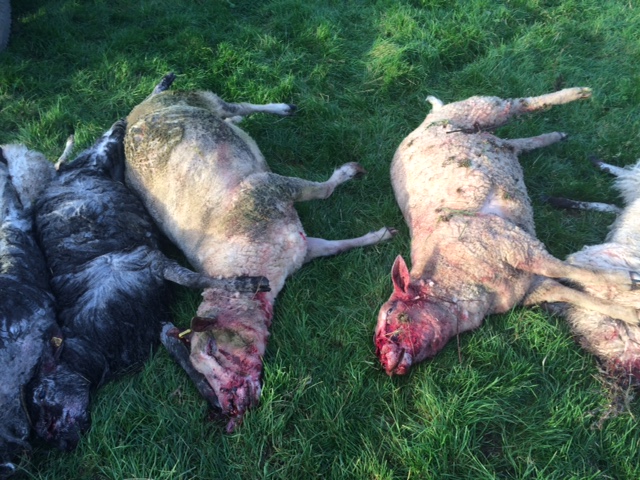Co. Wicklow’s urban-based county councillors’ eyes were opened last week after they met with the Wicklow Cheviot Sheep Owners’ Association (WCSOA), and heard about the devastation that dog attacks are causing across the region.
Representatives of the association made a presentation to the entire council last Monday (March 6), reiterating the need for action on the ongoing problem.
Speaking to Agriland, chair of WCSOA Pat Dunne said that a great response was received by all those present, who agreed to take steps to alleviate the issue.
“We showed some slides and images of what happens on farms all the time with dog attacks on sheep. We were meant to have a 20-minute slot and we got an hour and 15 minutes.
“Almost all the councillors spoke about the issue. We have a lot of urban councillors from north Wicklow and even they agreed that things need to be changed in relation to the by-laws around it,” he said.
The current by-laws around dog control “are of absolutely no use to us at the moment as far as I can see”, said Dunne, who explained that as it stands, dogs on the controlled breed list must be kept under “effectual control”. What exactly this means however, is hard to define, he said.
The National Parks and Wildlife Service (NPWS) has rules in place whereby dogs must be kept on a lead while on national parkland, and following WCSOA’s meeting, the council has said they will call on Coillte to implement the same regulations.
In addition, the association wants to see the number of dog wardens and the hours that they work revised.
“There are only two dog wardens in Wicklow and they do the best they can but there is no way that they could patrol the whole county,” Dunne said.
“One town is enough for one warden to manage so we’re looking for more. We want flexible hours as well, they need to be out on the weekend and show a presence. The uniform, it has an impact and deters people,” he added.
Speaking about the attack, he said that in addition to serious animal welfare concerns, with the loss of ewes and lambs, either through an attack or miscarriage, there is also a lot of money involved.
He reiterated that if the sheep are not found dead, often a vet will be required to put them down. Following this, the knackery must be called, which has a financial impact too.
“I’ve had attacks myself down through the years. I have sheep out on the mountain and I’m always worried in the back of my mind when I’m putting them out there,” he added.
Dunne told Agriland that members of the council also discussed the possibility of establishing a sub-committee to look into the various actions that could be taken on this issue.
“We are going to liase with Councillor Pat Kenny, who organised the meeting and try to keep the pressure on as much as we can,” concluded Dunne.

The Department of Rural and Community Development (DRCD) published a report titled; A review of measured relating to the control of dogs in Ireland, last year, following a public consultation on the matter.
WCSOA made a submission to this report outlining the extent of the problem and put forward 10 proposals.
These included a requirement that all dogs in public places be kept on leads, that dog walking should not take place in areas where the law is not enforced and that farmers should retain the right to shoot a dog on their private lands that they believe has harmed or is about to harm livestock.
